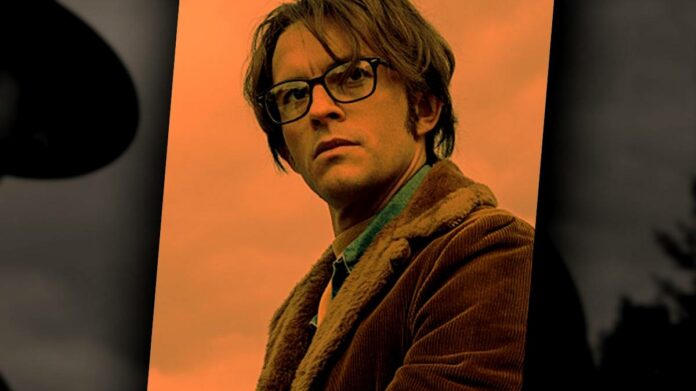Before I talk about the character of Tim Laughlin, I want to address Jonathan Bailey’s fine acting. From the alpha male Anthony in Bridgerton to the submissive and naive Tim in Fellow Travelers, he’s an absolute master of trickery. Honestly, I could’ve thought it was two different people; he’s so fantastic, but I digress. Tim is the epitome of a good boy in Fellow Travelers. I suppose in many ways his relationship with Hawk is a perfect example of the “bad boy-good boy” trope. Still, Hawk is an aspirational figure for Tim. He’s the man that Tim always dreamed of being—someone who can make a change and command power. While Hawk struggles with this exact power, consuming his whole being, Tim is forced to question his faith because of his queerness.
Tim’s biggest conflict is that between God and Hawk. On more than one occasion, Tim compares Hawk to God himself. At first, he says that between his love for God and his love for Hawk, one is real and one is a fantasy. I suppose even with his relationship with Hawk being a “mortal sin,” Tim never gives up on God. To be fair, he never gives up on Hawk either, no matter what we’re made to believe somewhere in the middle. This is why, at the end of the show, when Tim refers to Hawk as God again, it’s in a way that they’ve both become one; in this way, his love for God and Hawk are both real and both fantasy. Tim idealizes Hawk, and in those last moments, he says it doesn’t matter if it’s a one-sided love; it’s an all-consuming one, the best kind he could’ve wished for. With the years in between, we can imagine that Tim has finally accepted that he’s not committed any sins by being in love. It’s just “love.”
Of course, this is why Tim is the first of the two to fall, and the one who crashes. Hawk’s first line of defense is his masculinity; Tim has none of that. He’s transparent as a glass of water. At some point in the series, I was left wondering why it had to be Tim who was sick and not Hawk. He is after all the better person of the two; why is it always the good who have it bad? Every time Tim and Hawk are separated, Tim tries to find his escape in religion. Although he did try the army at some point, I suppose, even in the way that Tim keeps forgiving Hawk, it parallels the act of accepting any curveball thrown by God. Right from the get-go, there is an obvious powerplay between Hawk and Tim. The former had the upper hand in all aspects of the relationship pretty much till the very end. Hawk is allergic to attachment, while Tim is practically swimming in it. We could factor in the age gap between them in this matter too. Tim is so innocent, drinking milk instead of alcohol the first time the two meet.
Mary, Hawk’s queer assistant, becomes quite close with Tim when they start pretending to be a thing for the world (thanks to Hawk, of course). She too keeps reminding Tim multiple times in the show, just like Marcus, that Hawk isn’t one to open his emotional doors. She does try to warn him many times, but it’s only when Hawk puts a magic carpet under Tim’s feet and then drags it out from under him does Tim realize the true nature of this man he’s admired for so many years. Yet still, his instinct is to believe him, no matter what. Contrary to Hawk’s selfish ways, Tim is always concerned about others. This is why he quits the job at the McCarthy office when he isn’t so certain about the man’s intentions. This puts everything at risk for Tim, but he still steps away and immediately rushes to Hawk. While Hawk didn’t even think twice to report Tim because he was an “inconvenience,” Tim’s always the one to do the right thing, no matter the consequences.
This is why, when Hawk decides to marry Lucy, Tim heads off to the army to get away from him and very well manages to keep away until Hawk writes a letter to him and then later tries to save Tim from the police. There’s no denying Tim is righteous in every sense of the word, but he never judges Hawk for what he truly is—a monster—something that Hawk himself knows but Tim is in denial of. Tim even forgives Lucy, who burned his letter to Hawk, knowing that if he had seen the letter their lives might’ve turned out different. He always puts Hawk’s family first. Getting to know Jackson helps Tim realize that his only hope to stay out of Hawk’s life is to go to prison.
Interestingly, even when Hawk is trying desperately to avoid the family he made for himself, it’s Tim who reminds him that he shouldn’t. He could’ve easily picked a life of fun and liberation with Hawk when Jackson died, but it would’ve been taking advantage of a terrible situation, something Tim would never do (Hawk on the other hand…). Even in death, Tim is the bigger person. As much as Tim doesn’t want to die, he’s also fighting for a cause—the thing he’s wanted to do his whole life. It is something of a perfect ending for him; he’s confessed his feelings to the love of his life after three decades of playing a game of push and pull. He’s always chosen to do the right thing, and he’s helped many people like himself; there was nothing more he could ask for. Tim’s death allows Hawk to be liberated and admit his homosexuality to his daughter. In death, Tim is the one who changes Hawk to finally become a better man.

